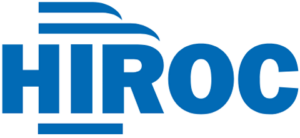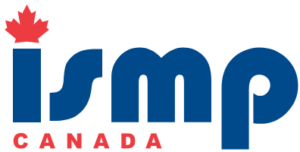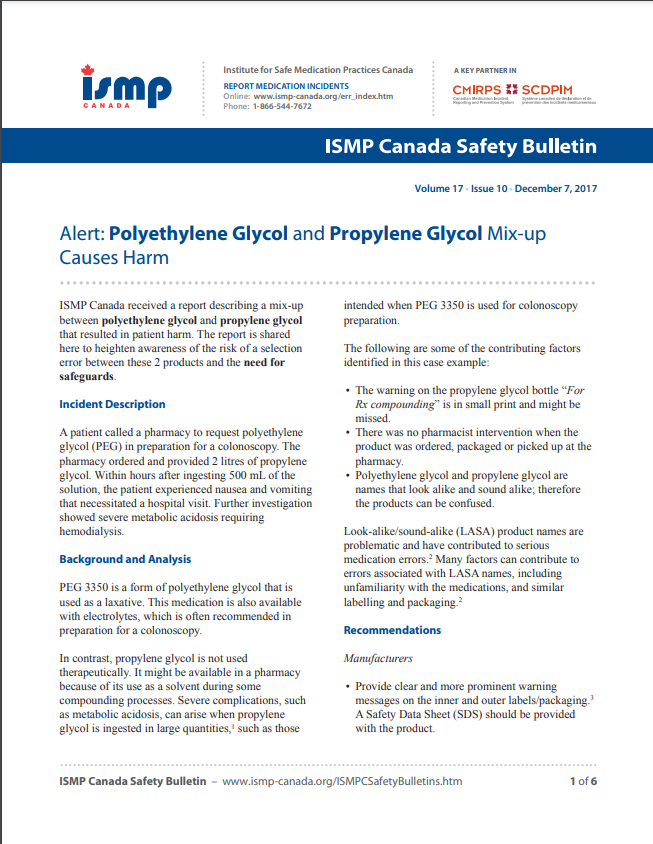Alert: Polyethylene Glycol and Propylene Glycol Mix-up Causes Harm
ISMP Canada received a report describing a mix-up between polyethylene glycol and propylene glycol that resulted in patient harm. The report is shared here to heighten awareness of the risk of a selection error between these 2 products and the need for safeguards.
INTRODUCTION
ISMP Canada received a report describing a mix-up between polyethylene glycol and propylene glycol that resulted in patient harm. The report is shared here to heighten awareness of the risk of a selection error between these 2 products and the need for safeguards.
INCIDENT DESCRIPTION
A patient called a pharmacy to request polyethylene glycol (PEG) in preparation for a colonoscopy. The pharmacy ordered and provided 2 litres of propylene glycol. Within hours after ingesting 500 mL of the solution, the patient experienced nausea and vomiting that necessitated a hospital visit. Further investigation showed severe metabolic acidosis requiring hemodialysis.
BACKGROUND AND ANALYSIS
PEG 3350 is a form of polyethylene glycol that is used as a laxative. This medication is also available with electrolytes, which is often recommended in preparation for a colonoscopy.
In contrast, propylene glycol is not used therapeutically. It might be available in a pharmacy because of its use as a solvent during some compounding processes. Severe complications, such as metabolic acidosis, can arise when propylene glycol is ingested in large quantities,1 such as those intended when PEG 3350 is used for colonoscopy preparation.
The following are some of the contributing factors identified in this case example:
- The warning on the propylene glycol bottle “For Rx compounding” is in small print and might be missed.
- There was no pharmacist intervention when the product was ordered, packaged or picked up at the pharmacy.
- Polyethylene glycol and propylene glycol are names that look alike and sound alike; therefore the products can be confused.
Look-alike/sound-alike (LASA) product names are problematic and have contributed to serious medication errors.2 Many factors can contribute to errors associated with LASA names, including unfamiliarity with the medications, and similar labelling and packaging.2
RECOMMENDATIONS
Manufacturers
- Provide clear and more prominent warning messages on the inner and outer labels/packaging.3 A Safety Data Sheet (SDS) should be provided with the product.
Wholesalers and distributors
- Add warning flags in electronic ordering systems for products intended for compounding use only.
Pharmacies
- Question patient requests to purchase products used primarily or exclusively for compounding. Ask for the indication or reason for use and involve the pharmacist.
- Confirm the product with the patient, both at the time of the request and during counselling at pick-up. This is similar to the intake and handoff process for prescription products and would create additional verification opportunities.
- Store compounding supplies in a separate area of the pharmacy.
- Ensure SDS documents are available and accessible for all compounding products stored in the pharmacy
Prescribers
- Provide patients with written instructions for products to be purchased in preparation for medical procedures such as bowel cleansing, that includes the product name and directions for use.
![]()
The Canadian Medication Incident Reporting and Prevention System (CMIRPS) is a collaborative pan-Canadian program of Health Canada, the Canadian Institute for Health Information (CIHI), the Institute for Safe Medication Practices Canada (ISMP Canada) and Healthcare Excellence Canada (HEC). The goal of CMIRPS is to reduce and prevent harmful medication incidents in Canada.
Funding support provided by Health Canada. The views expressed herein do not necessarily represent the views of Health Canada.

The Healthcare Insurance Reciprocal of Canada (HIROC) provides support for the bulletin and is a member owned expert provider of professional and general liability coverage and risk management support.

The Institute for Safe Medication Practices Canada (ISMP Canada) is an independent national not-for-profit organization committed to the advancement of medication safety in all healthcare settings. ISMP Canada’s mandate includes analyzing medication incidents, making recommendations for the prevention of harmful medication incidents, and facilitating quality improvement initiatives.
Report Medication Incidents (Including near misses)
Online: ismpcanada.ca/report/
Phone: 1-866-544-7672
ISMP Canada strives to ensure confidentiality and security of information received, and respects the wishes of the reporter as to the level of detail to be included in publications.
Stay Informed
Subscribe to the ISMP Canada Safety Bulletins and Newsletters.
This bulletin shares information about safe medication practices, is noncommercial, and is therefore exempt from Canadian anti-spam legislation.
Contact Us
Email: cmirps@ismpcanada.ca
Phone: 1-866-544-7672
©2026 Institute for Safe Medication Practices Canada.
